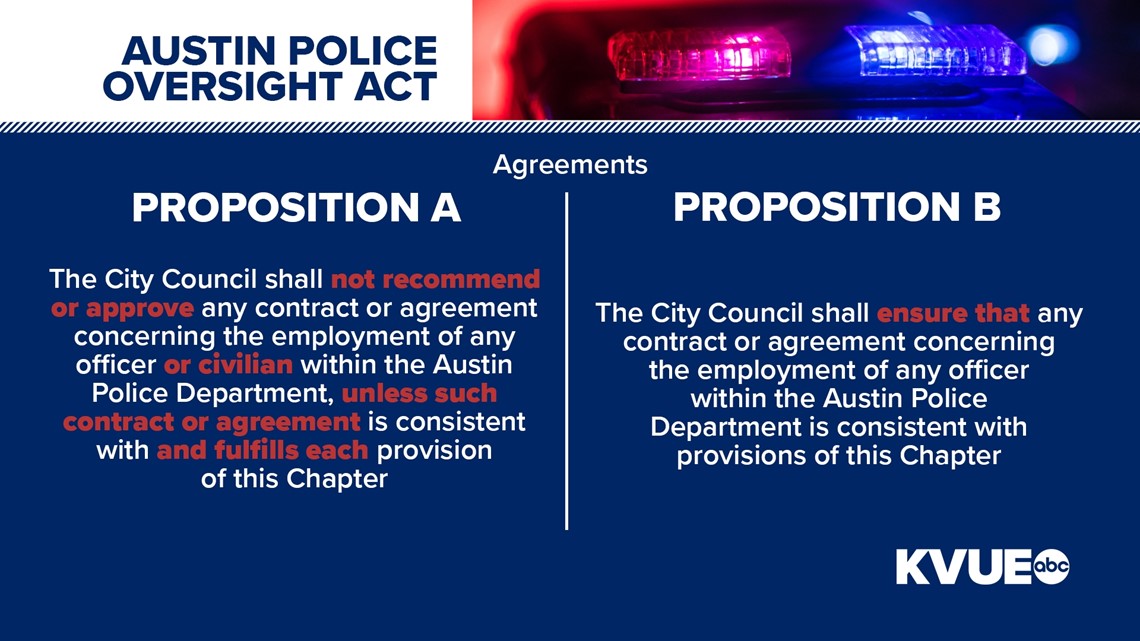Breaking down the differences between Austin's Prop A and Prop B
To save you time and help educate voters on the ballot propositions, KVUE's Managing Editor of Political Content is showing the differences, line by line.
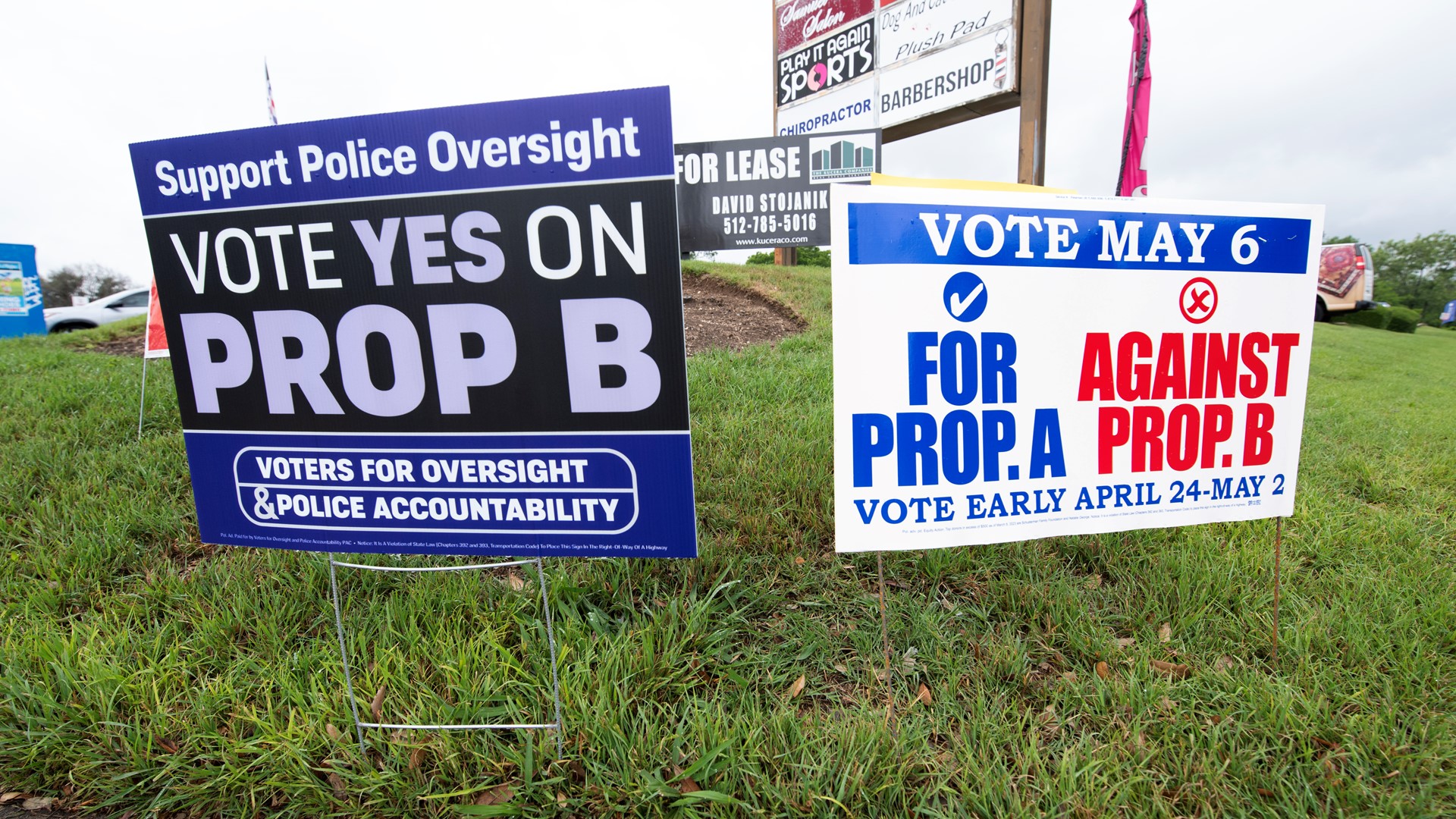
This May, Austin voters will decide if they want to enact a new ordinance governing police oversight in the city.
Two competing citizen petitions resulted in two propositions on the ballot. Proposition A and Proposition B both aim to enact the Austin Police Oversight Act. And that's not where the similarities in the two measures end.
Many sections of the ordinances the propositions would put in place are the exact same – verbatim. But the differences between the two – the words and phrases that are in Prop A but do not appear in Prop B – give voters a choice between enacting a more robust oversight policy, enacting one that is less stringent or leaving the policy in the hands of the mayor and city council.
What's on the ballot?
The language on the ballot for Prop A and Prop B is incredibly similar, so let's highlight the differences.


Prop A comes from Equity Action, a criminal justice reform group. Prop B is the work of Voters for Oversight and Police Accountability, a political action committee almost entirely funded by the Austin Police Association.
The only other difference in what you'll see on the ballot is the goal of the ordinances. Prop A aims to "deter police misconduct and brutality" by strengthening the City's police oversight. Prop B just aims to strengthen police oversight.
Voters can cast ballots for or against each proposition.
Why are there two props on the ballot?
Last summer, Equity Action started a petition to enact the "Austin Police Oversight Act." The Austin City Council had two options – adopt the ordinance as it was written by Equity Action or send it to the voters to decide. In September 2022, the council decided to let voters weigh in.
In November 2022, Voters for Oversight and Police Accountability initiated its own ordinance petition to enact an almost identical version of the "Austin Police Oversight Act." That petition was certified in February 2023, and the council – who again could only decide between adopting the ordinance as written or letting voters decide – voted to send the measure to Austin voters.
This was all happening as the City and the Austin Police Association were in talks about a new police contract. Oversight was a major factor in those negotiations, and the council wanted to wait to see the results of the May election before agreeing to a contract with the association.
What is the Austin Police Oversight Act?
Both Prop A and Prop B would enact a city ordinance called the "Austin Police Oversight Act." Under both propositions, the ordinance would dictate the role and powers of the Office of Police Oversight and the Community Police Review Commission.
The act outlines the duties of the police chief in police oversight and both have clauses to ensure police transparency. The overall difference between the propositions is how they go about achieving the end goal. Prop A would be require more robust oversight than Prop B.

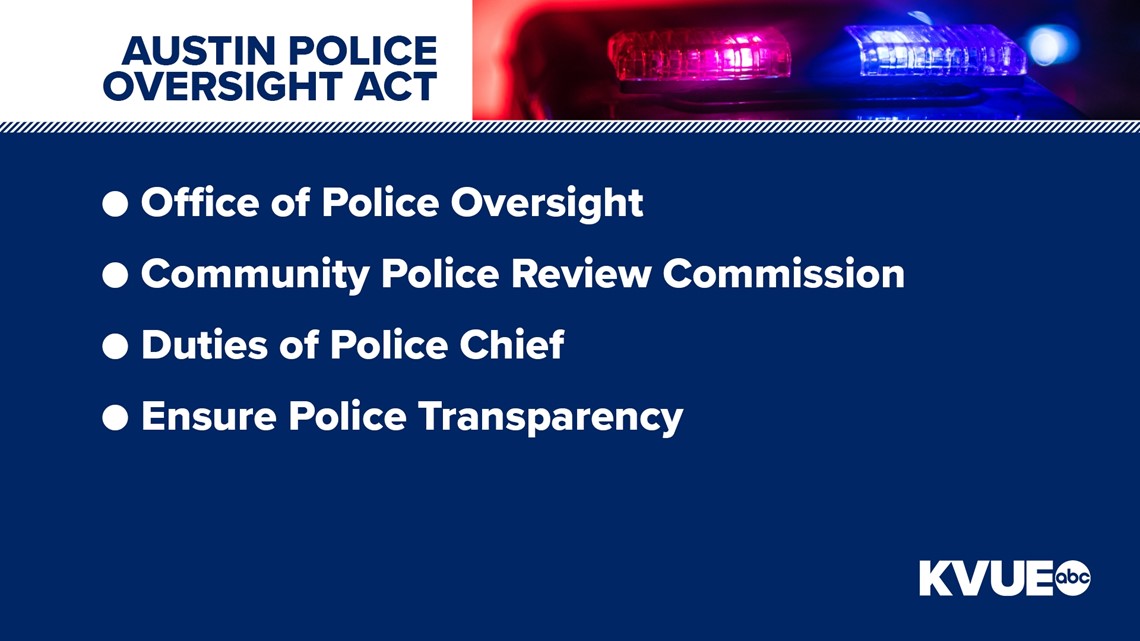
Breaking down the ordinances
Because the ordinances are nearly identical, finding the differences between the two can take a lot of time and a careful eye. To make it easier for you to learn the differences, Ashley Goudeau, KVUE's Managing Editor of Political Content, combed through the ordinances to find the differences.
Here's what she found:
Chapter 2-15-3 Office of Police Oversight
The sections of the ordinances dealing specifically with the Office of Police Oversight contain numerous differences. You can read about them and see the language of the ordinances below.
When laying out the duties of the office, Prop A would allow the office to receive anonymous complaints and compliments about Austin police. Prop B does not allow this.

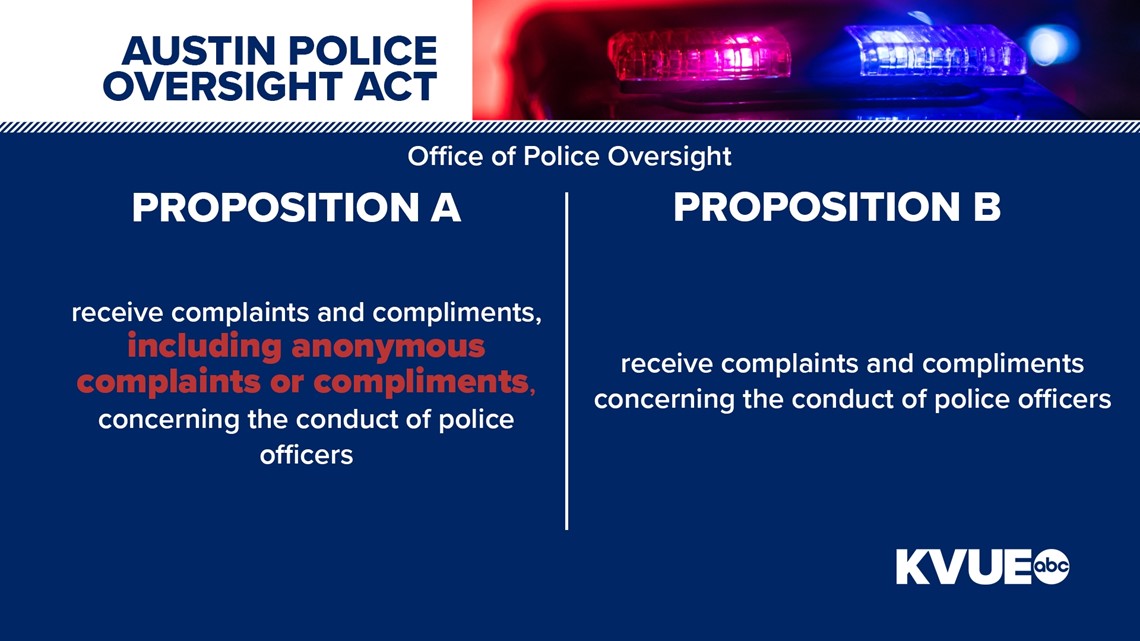
Prop A would require the office to make disciplinary recommendations to the police chief after an investigation of officer conduct. Prop B only requires those recommendations after investigations of misconduct.

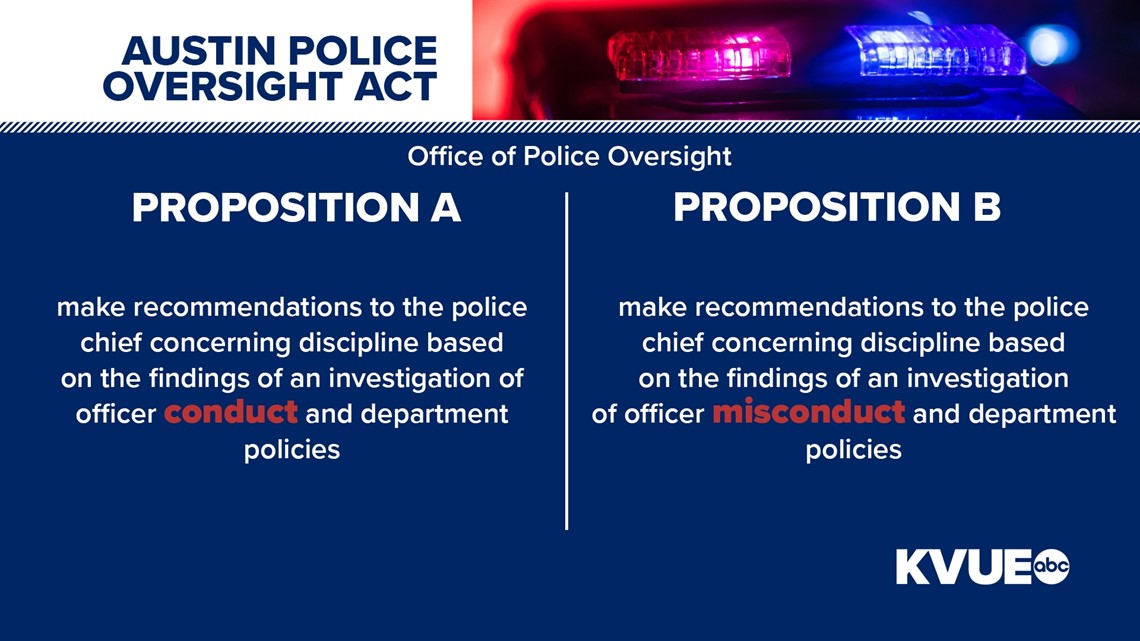
Both propositions would require the office to make recommendations to the city manager and police chief about potential violations. But Prop A goes even further in its version of this clause and requires at least a preliminary investigation of every complaint. And the recommendations have to be given to the police chief before he makes a decision on discipline.

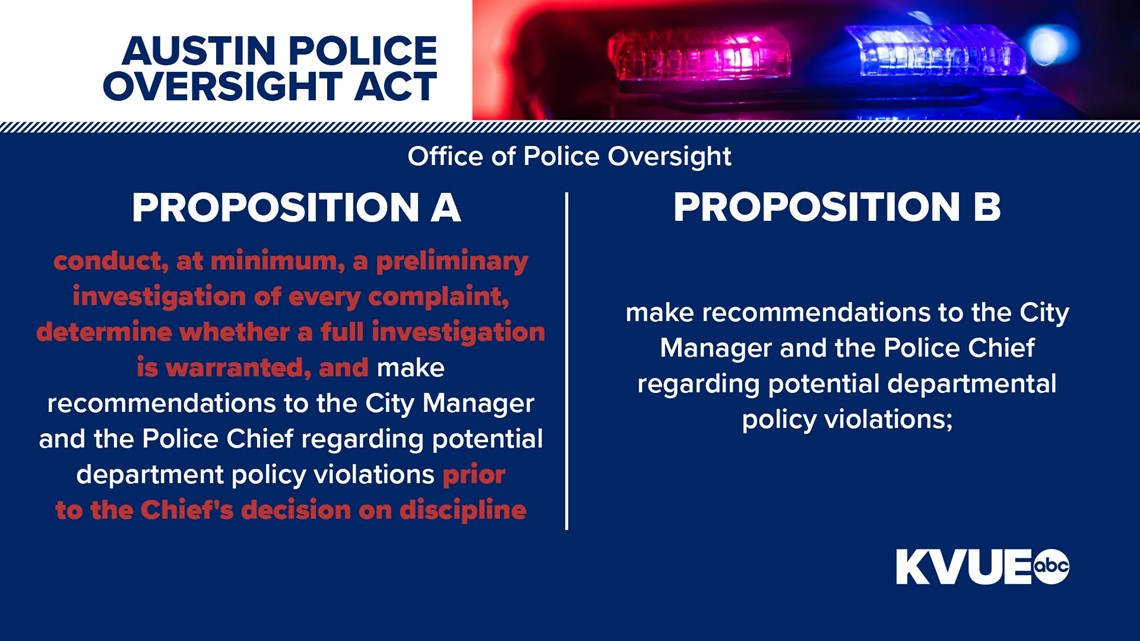
Both propositions want the office to analyze all force incident data, but under Prop B, the office would only look at data that's been prepared and released by the Austin Police Department. In Prop A, the office would analyze all the data and also conduct random assessments of use of force reviews and random audits of body camera video.

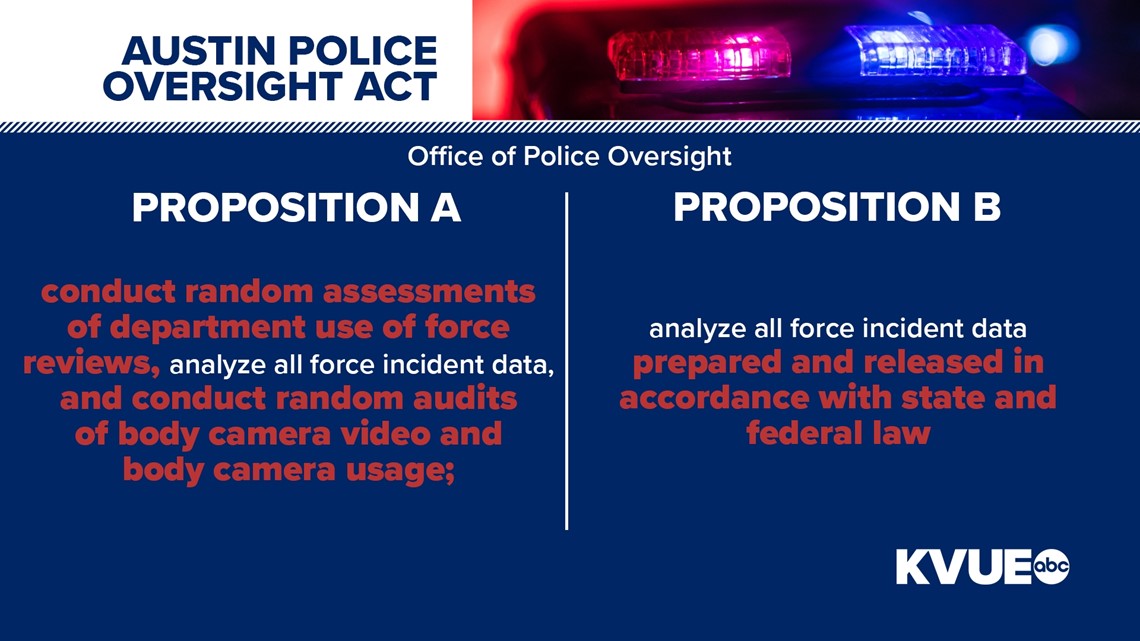
Prop A has a more robust list of information the office would have to make public, including the outcomes of complaints, officer discipline and a list of lawsuits and settlements filed against the City for officer misconduct. Prop B doesn't call for that information to be released to the public.

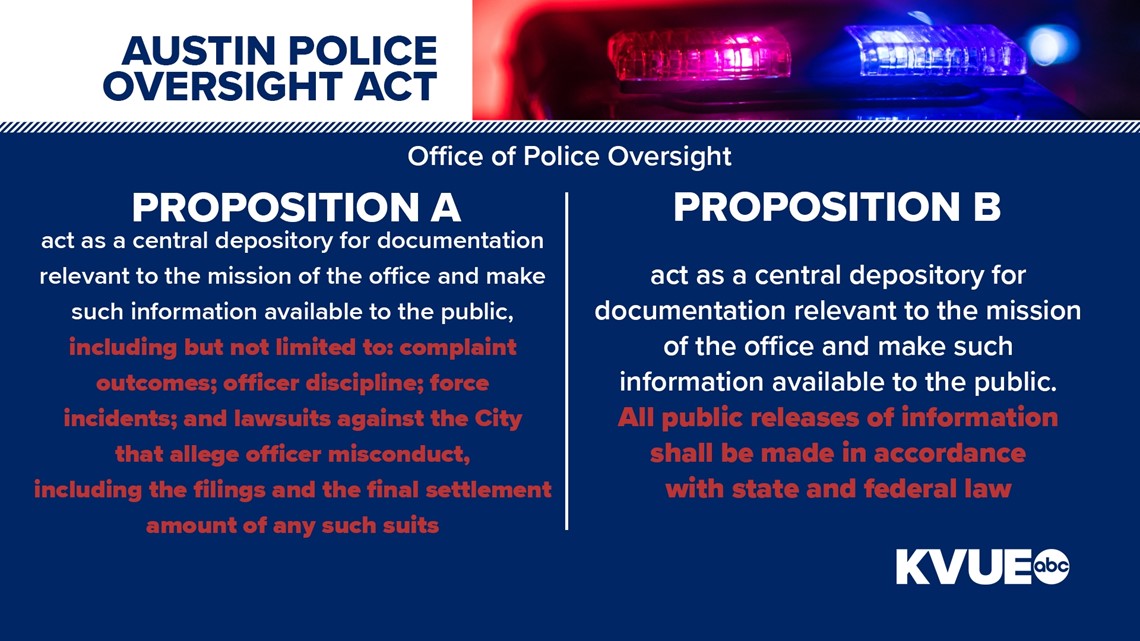
When investigating police misconduct, Prop A would give the director of the Office of Police Oversight or their designated staff access to records and personnel with relevant information about an investigation. Under Prop B, they only get access to the records.

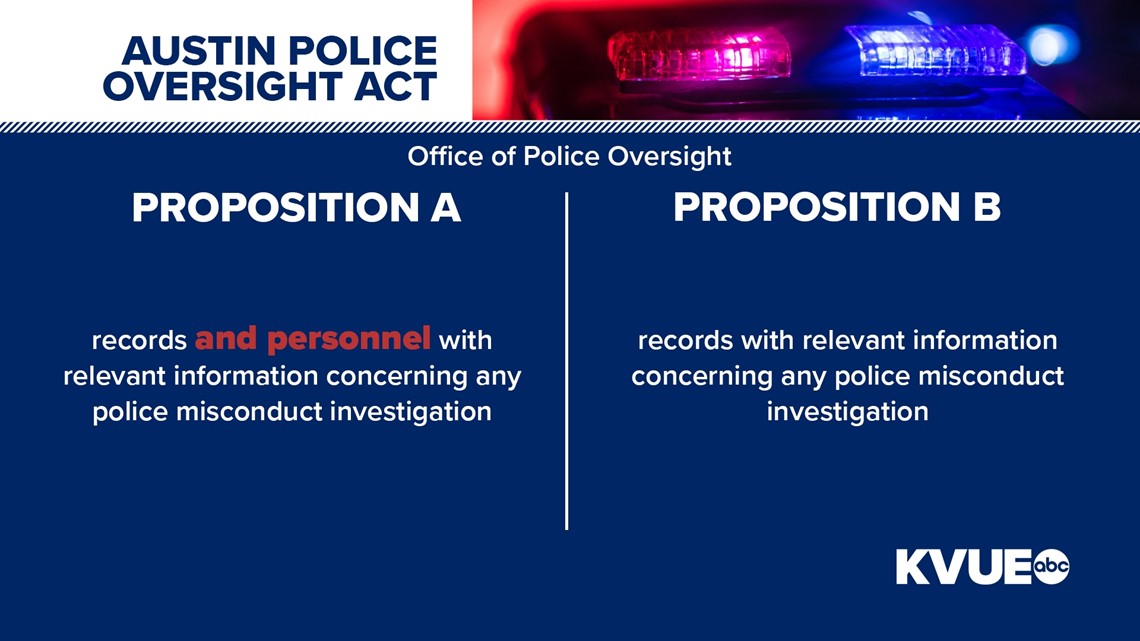
In addition to these changes, there are clauses governing the Office of Police Oversight in the Prop A ordinance that are not in the ordinance tied to Prop B.
Under Prop A, the office would participate in investigations of officer conduct, including those stemming from anonymous complaints. And the office would have the right to gather evidence and directly interview witnesses.
The office would also determine training requirements for members of the Community Police Review Commission.

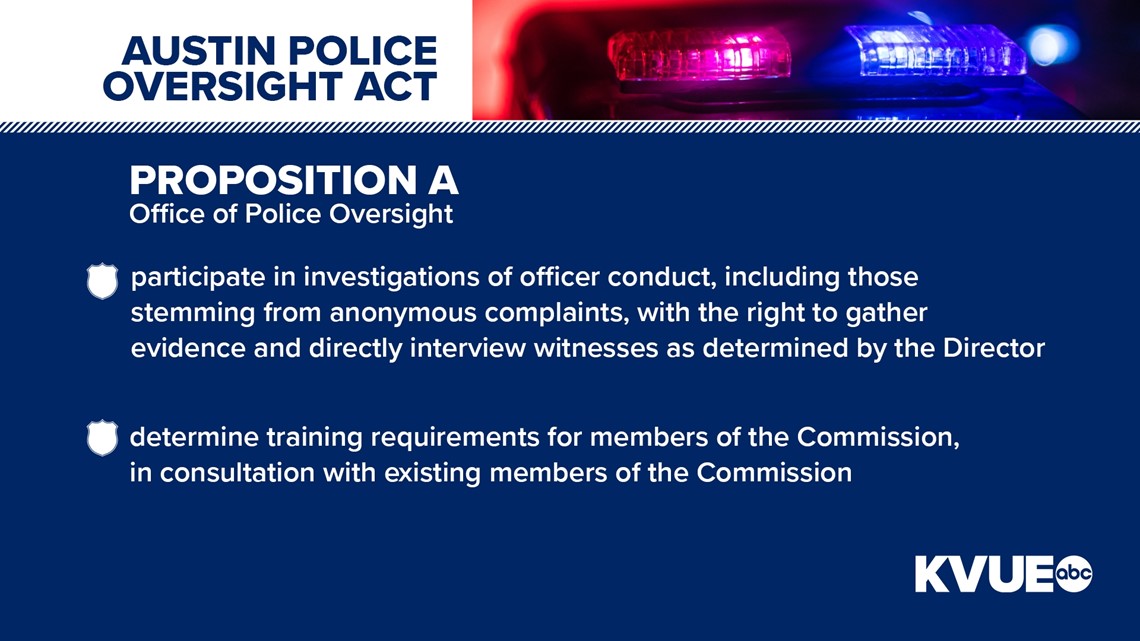
Under Prop A, the director of the Office of Police Oversight and their designees would have direct access to databases of use of force incident reports.

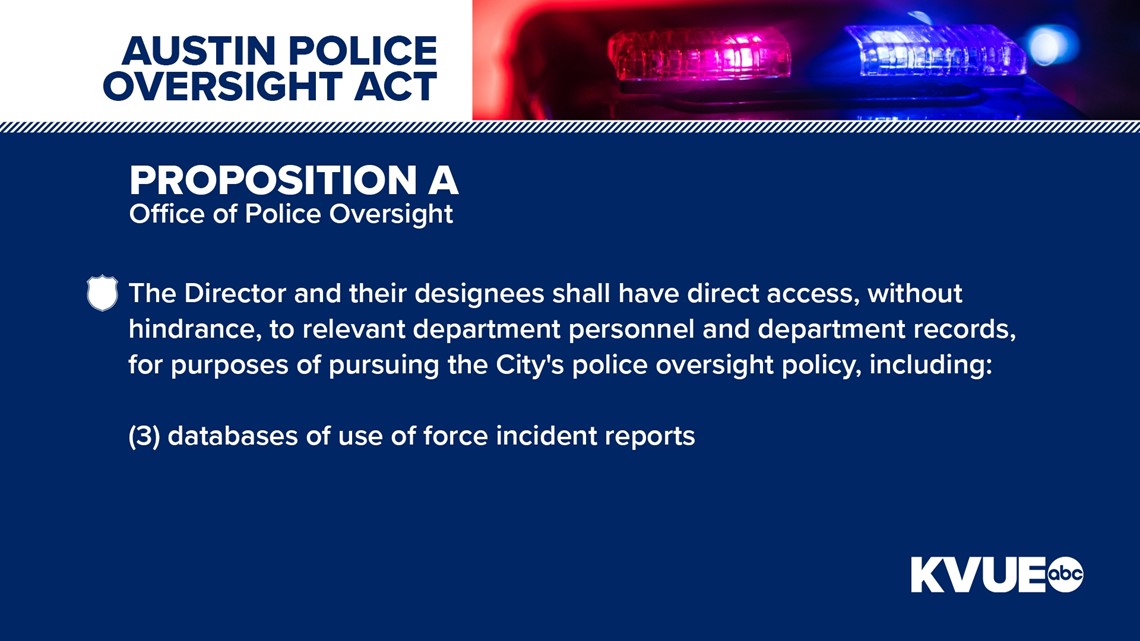
And lastly, Prop A would require the director of the office to give the public more information about APD, including a summary of all complaint outcomes; detailed information about incidents where they believe an officer should be disciplined, including the officer's name; and more.
Again, these four provisions are in Prop A but not in Prop B.

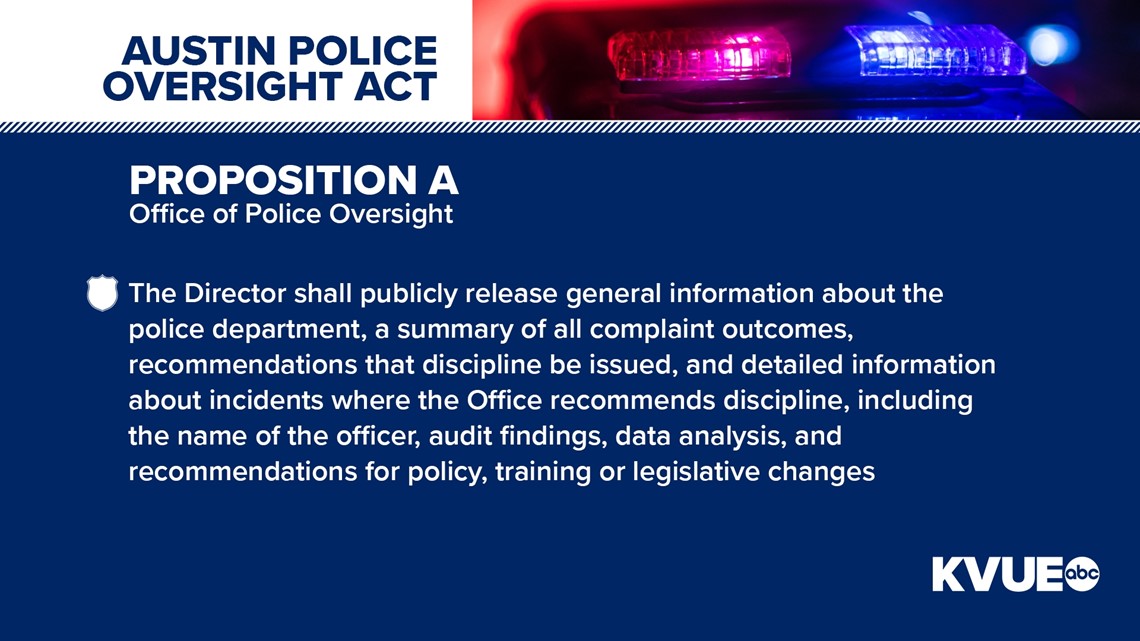
Chapter 2-15-4 Community Police Review Commission
The next section of the ordinances outlines the role and responsibilities of the Community Police Review Commission, the citizen group that will review APD.
One of the major differences between Prop A and Prop B is the types of cases the commission would be able to review.
Under both propositions, the commission could review investigations of death in custody, serious bodily injury or other serious misconduct once those investigations are complete. But under the ordinance tied to Prop A, the community commission would look at the cases before an officer is disciplined so it can make recommendations. And the commission would be able to look at other investigations if someone who filed a complaint against a police officer requests a review by the commission.

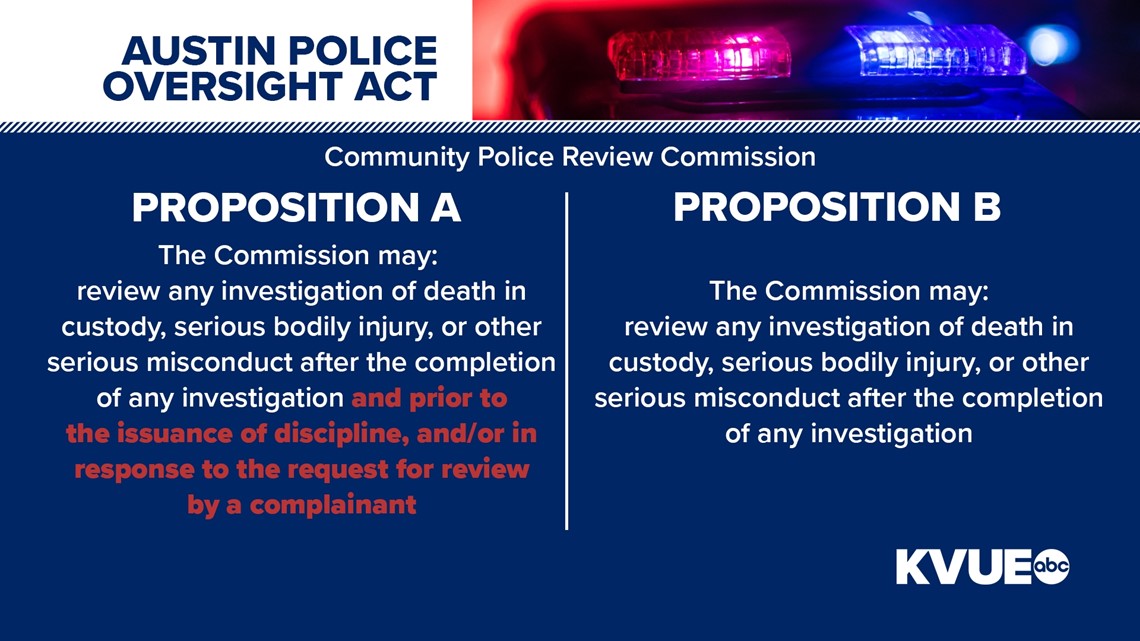
Both props allow the commission to make disciplinary recommendations to the police chief, request to be briefed by the director of the Office of Police Oversight and/or Internal Affairs and publicly release its recommendations. But the cases the commission could do that on are different.
Under Prop A, the commission can take those actions as they apply to all the cases it reviews. Meanwhile, Prop B is very specific, in that the commission can only do those things in cases of a death in custody, serious bodily injury or other serious misconduct. This difference is reflected in three sections of the ordinances.

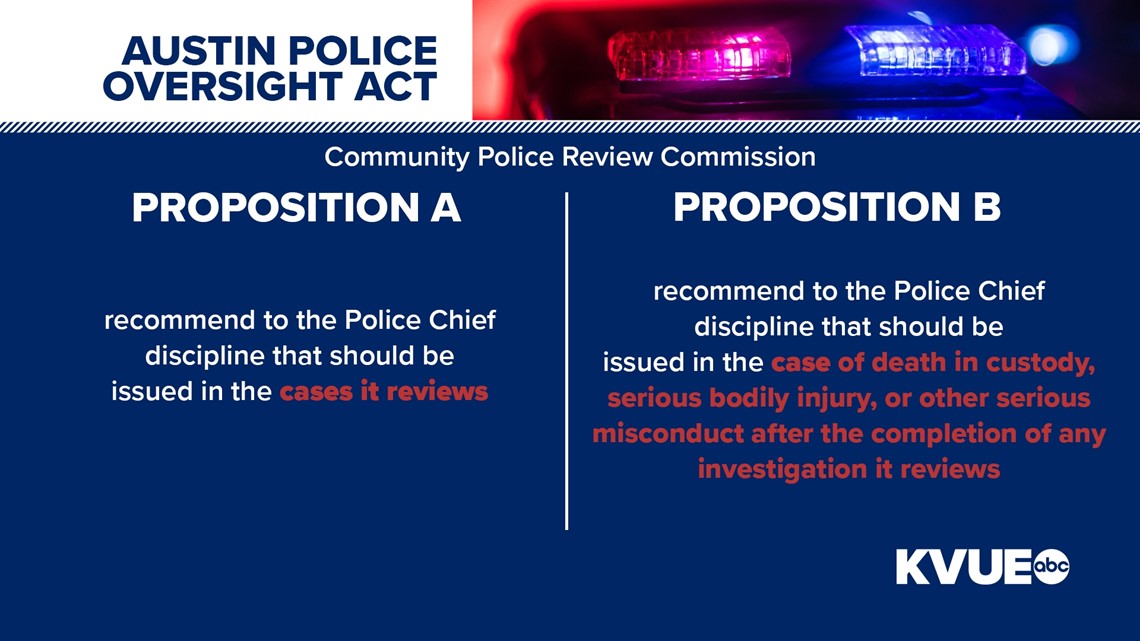

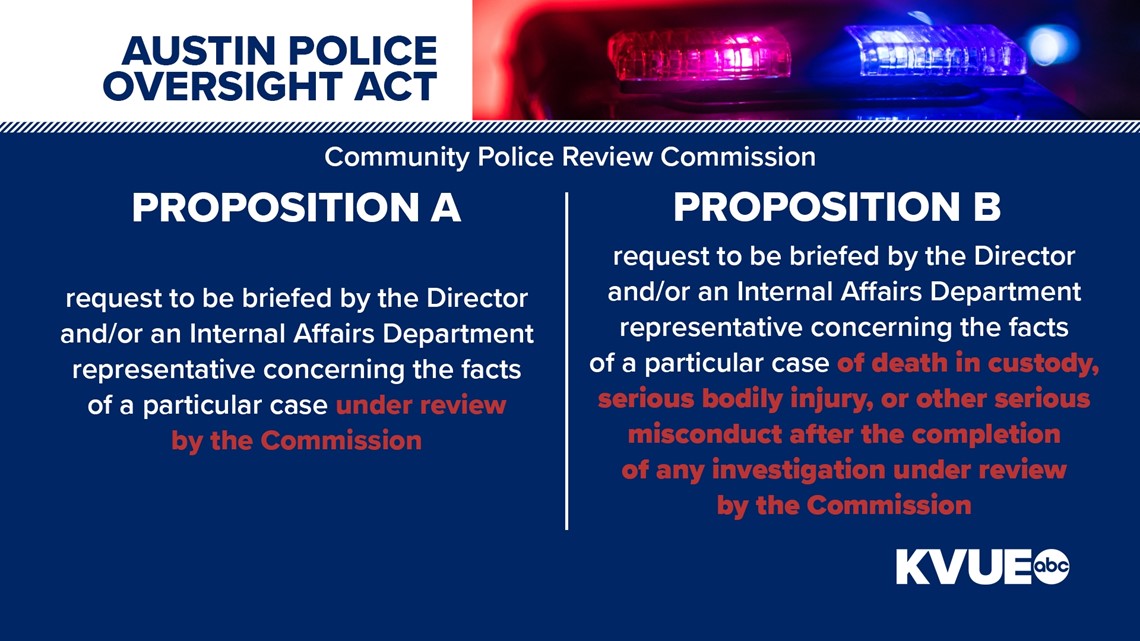

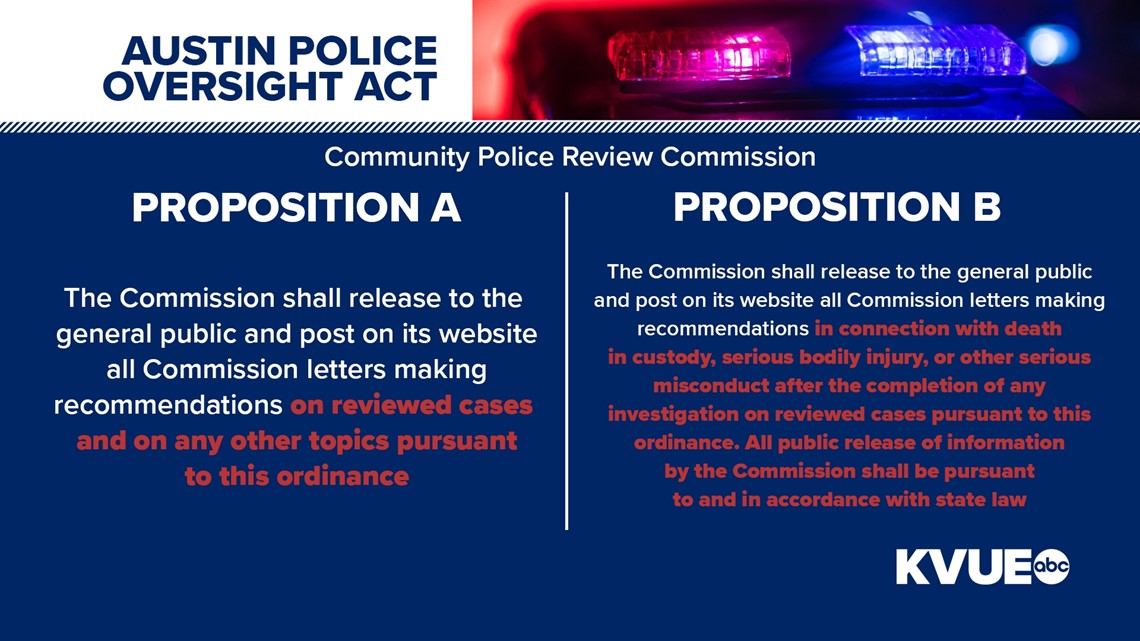
One of the most significant differences between Prop A and Prop B is who can serve on the commission. Under Prop A, an applicant can't have any connection to any member of a police department or association that represents police officers. They cannot be former officers and cannot have ever worked for or have been contracted by a police department or police association.
Under Prop B, people on the commission cannot have ever had a felony conviction or deferred adjudication for a felony and can't be under felony indictment. They also cannot have ever been indicted for a felony, crime of "moral turpitude" or charged with a Class A or B misdemeanor. If during their time on the commission they are indicted, convicted, or get deferred adjudication for a felony, they will immediately be removed from the commission.

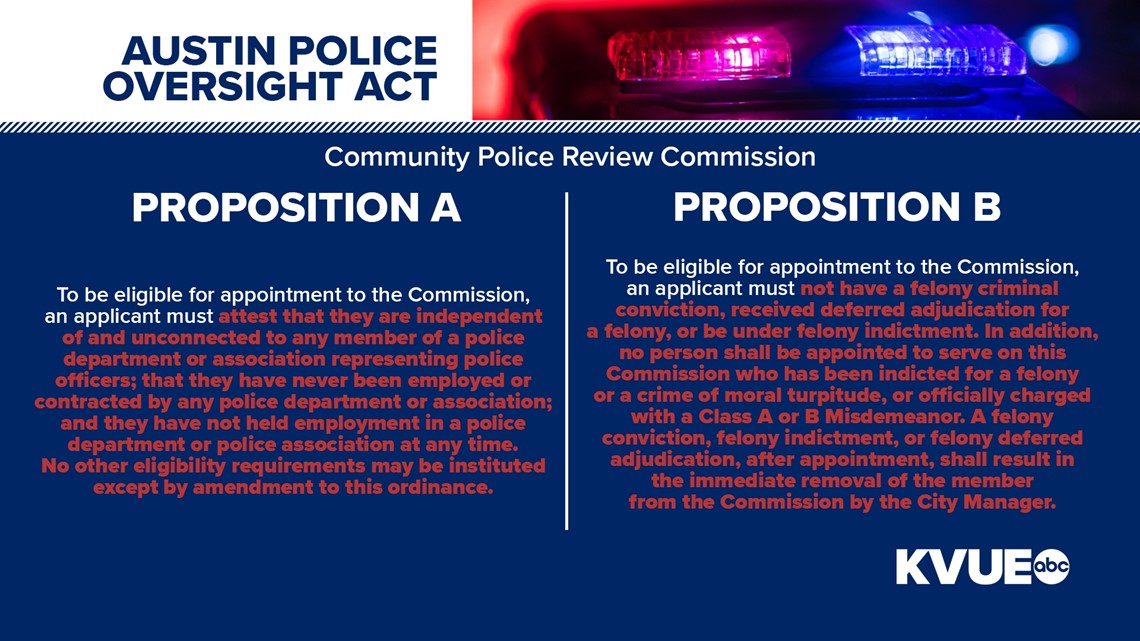
When it comes to the investigations the commission reviews, members would have direct access to all necessary APD records concerning investigations under Prop A, including body cam and dash cam video and incident reports. Under Prop B, members may only have "reasonable" access to relevant records.

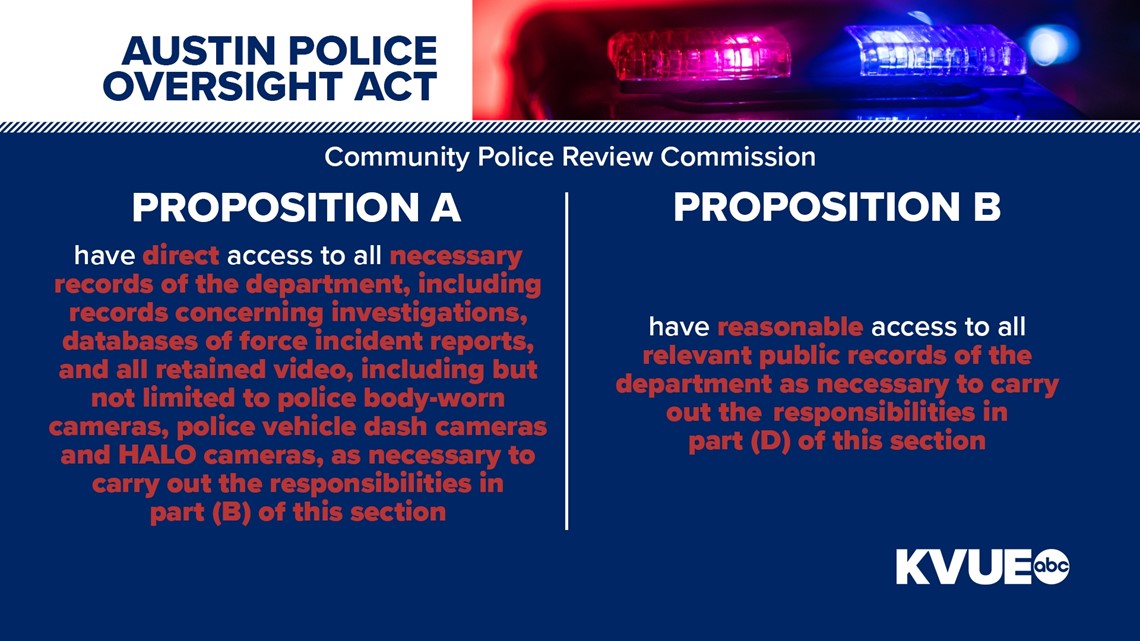
Prop A states the commission will get secure, online access to all necessary materials for as long as they require to prepare for meetings on cases. A clause like this is not in Prop B.

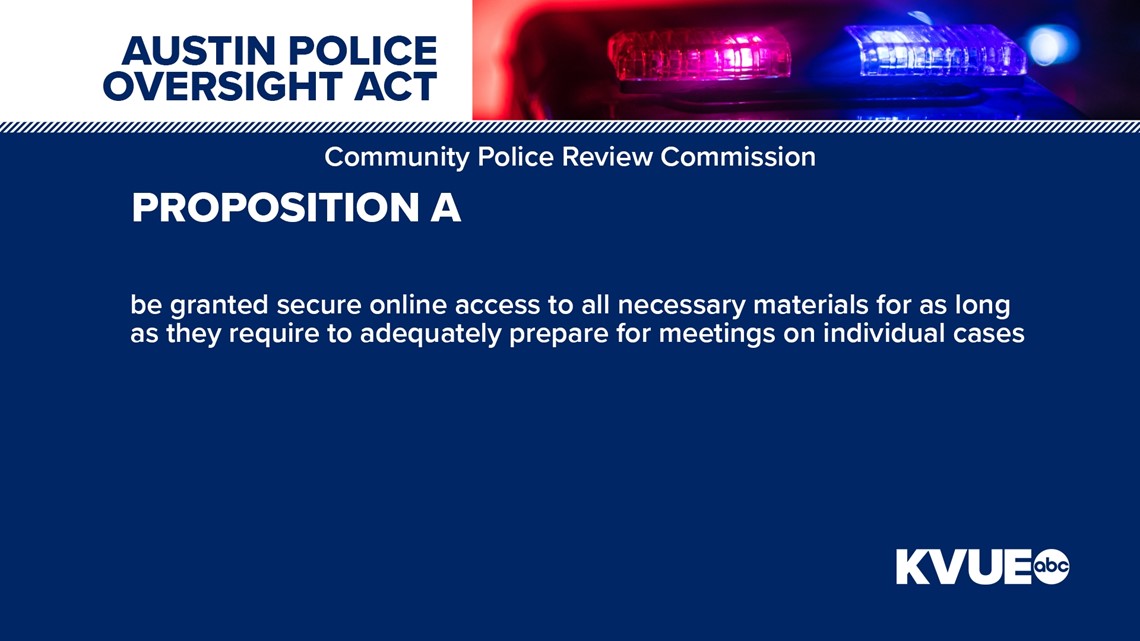
Lastly, under Prop A, members of the commission would be able to speak in general terms about issues they see in one or more cases. But if they knowingly release confidential information after being told it is sensitive information, they can be removed from the commission.
Under Prop B, members of the commission cannot talk about confidential information. And they would only be able to review confidential information in a designated, secure facility. Members who knowingly release confidential information will be immediately removed from the commission.

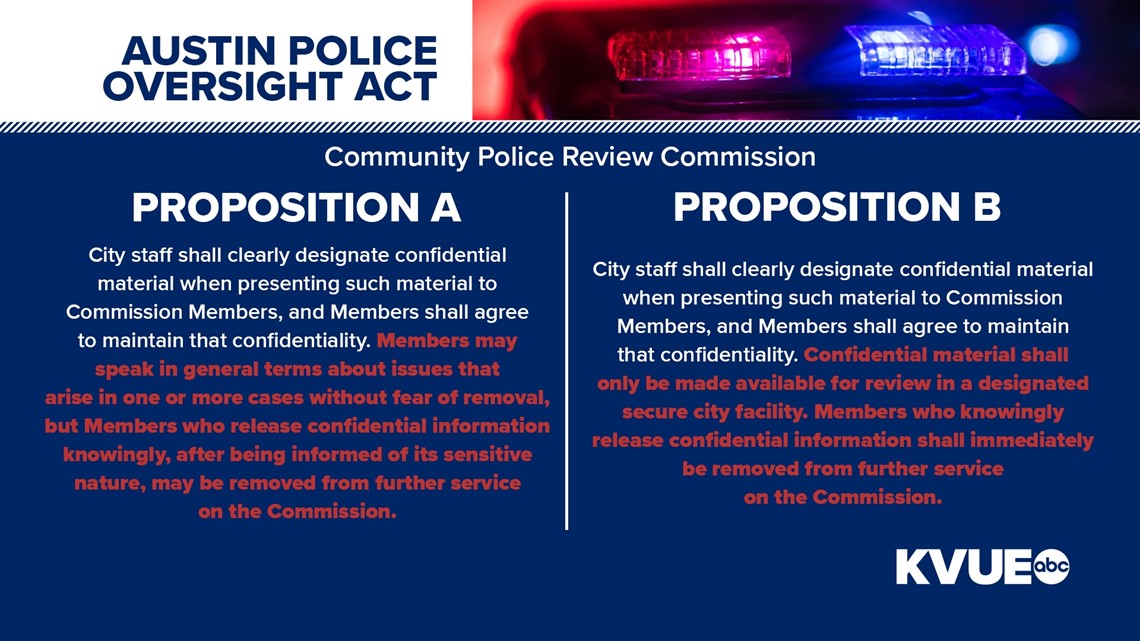
Chapter 2-15-5 Duties of Police Chief
The next section of the ordinances outlines the role and responsibilities of the police chief as they relate to police oversight.
The authority to discipline police officers for misconduct remains with the police chief under both propositions. But Prop A only gives the chief one year after a complaint is filed or he learns of misconduct to discipline an officer. And the discipline has to happen within three years of the incident.

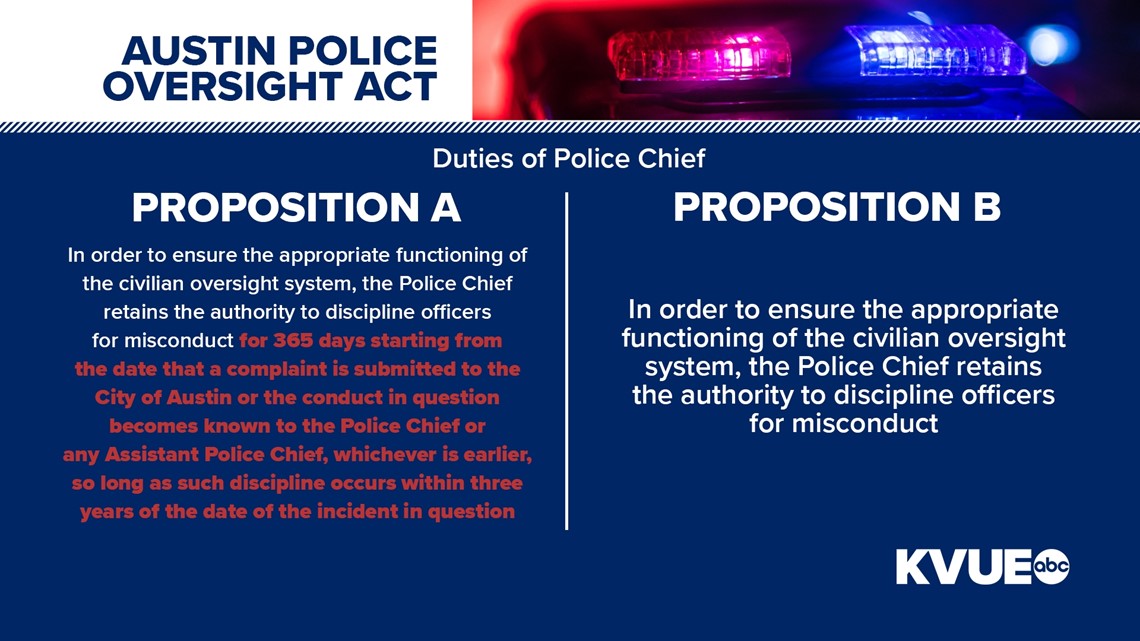
When the chief issues a disciplinary decision, Prop A would require the chief to issue a "detailed public, written explanation" if he does not follow a discipline recommendation from the Office of Police Oversight.
Under Prop B, the chief will also have to provide a "detailed public, written explanation," but only on decisions subject to section 143.089(a) of the Texas Government Code. That section of the code governs personnel files. So if a disciplinary decision is going into an officer's file, the chief will have to publicly say why.

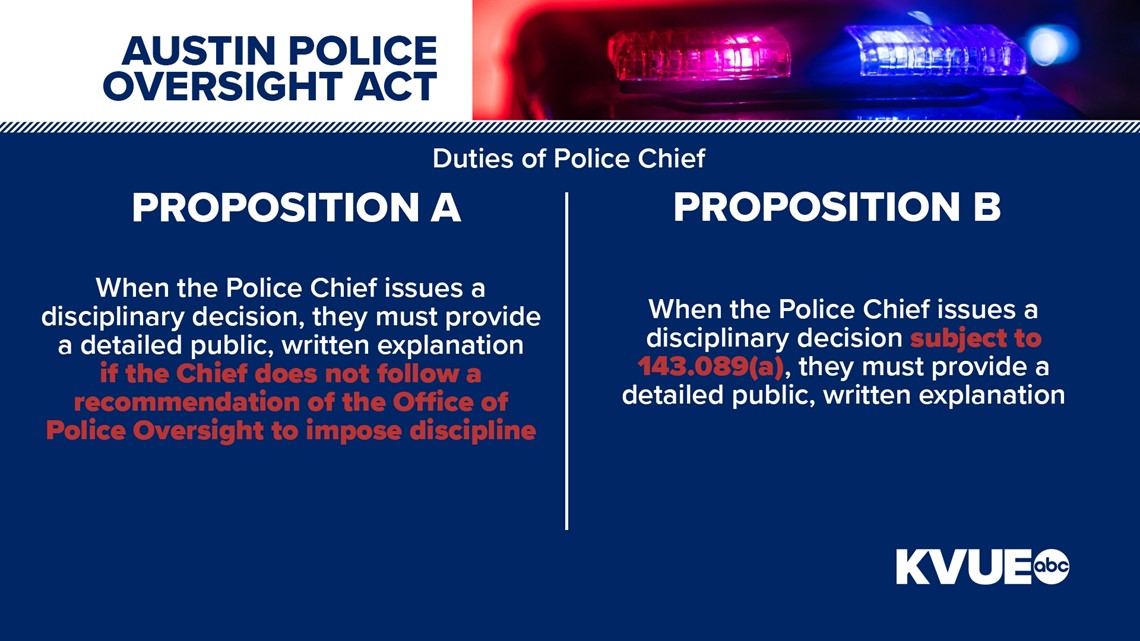
If the Community Police Review Commission requests a briefing on a case or investigation, the chief has to direct Internal Affairs to brief the commission.
Under Prop A, that briefing should include information from the investigation and the presenter can omit highly personal information to protect someone's privacy. Under Prop B, those briefings can only happen if the case or investigation is in the purview of the commission.

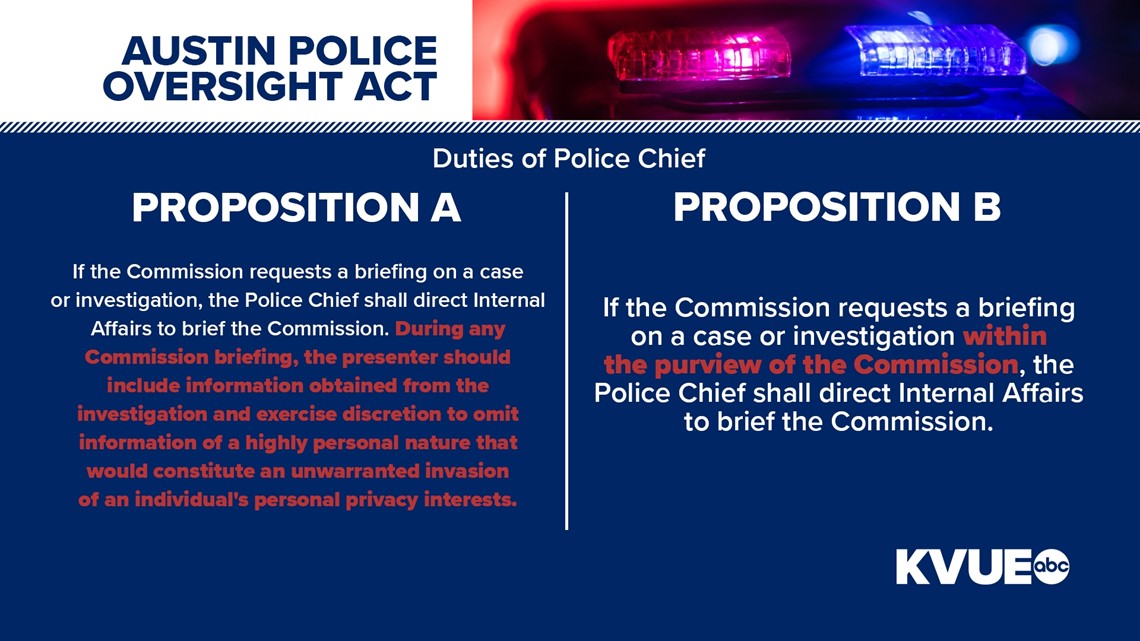
Prop A would require the police chief to issue responses that are not required under Prop B.
Under Prop A, the chief would have to issue a public, written response to the annual report issued by the Office of Police Oversight on office activities. That annual report would include information about complaints, officer misconduct, discipline and more. The chief's response would have to be issued within 90 days.

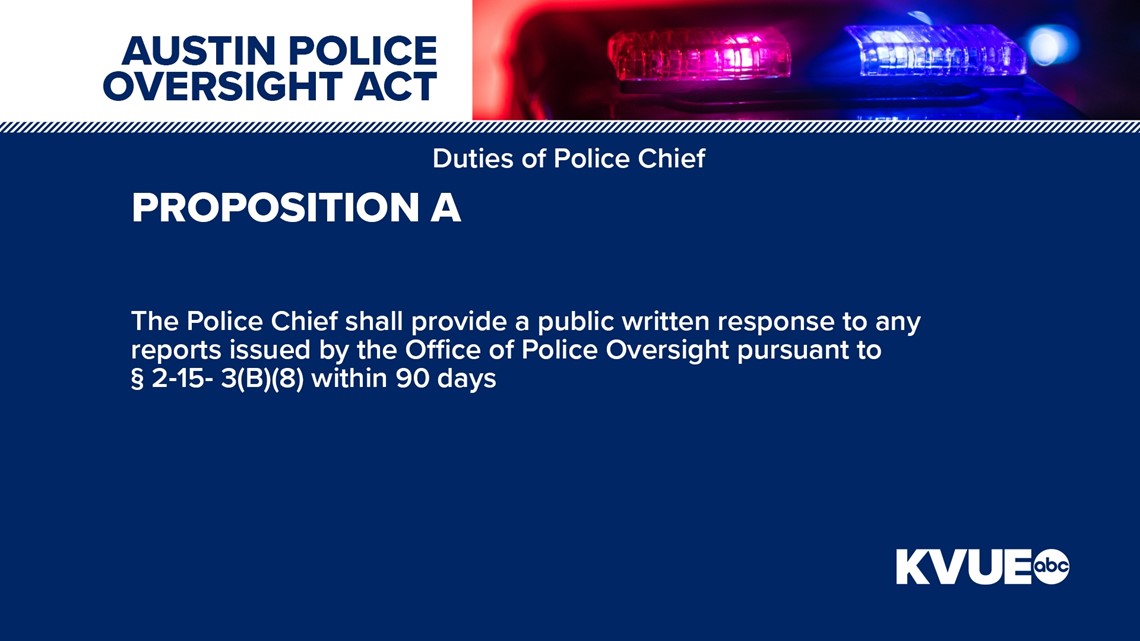
Under Prop A, if the Community Police Review Commission recommends an officer be disciplined and the chief decides not to follow that recommendation, the chief would have to issue a public, written response within 90 days.

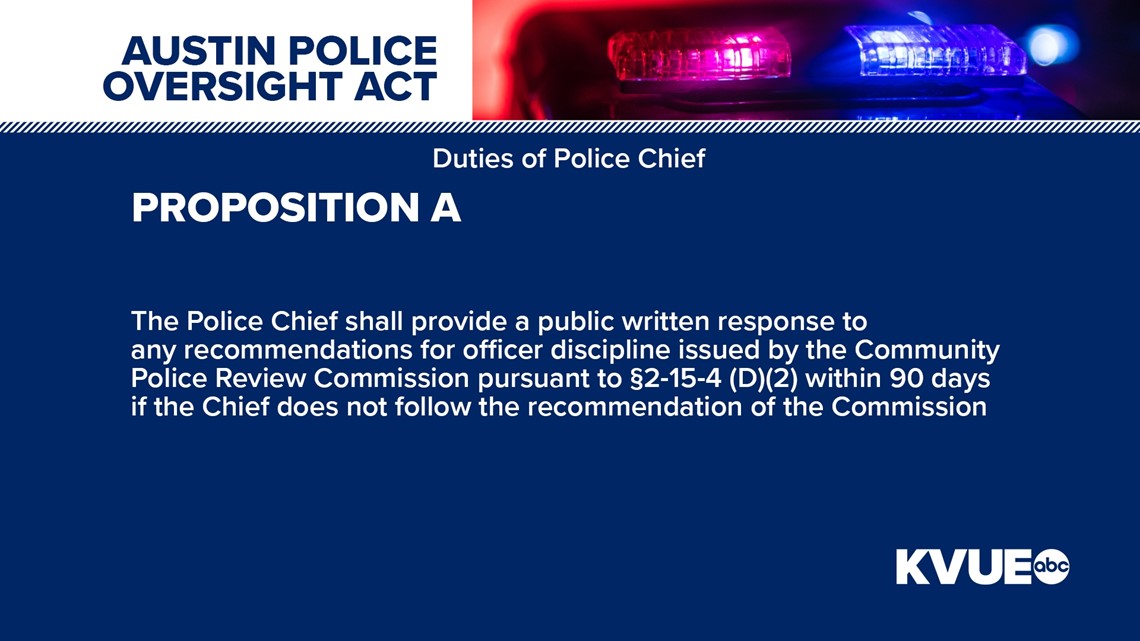
Lastly, the chief would have 90 days to give a public, written response to proposals from the Community Police Review Commission.

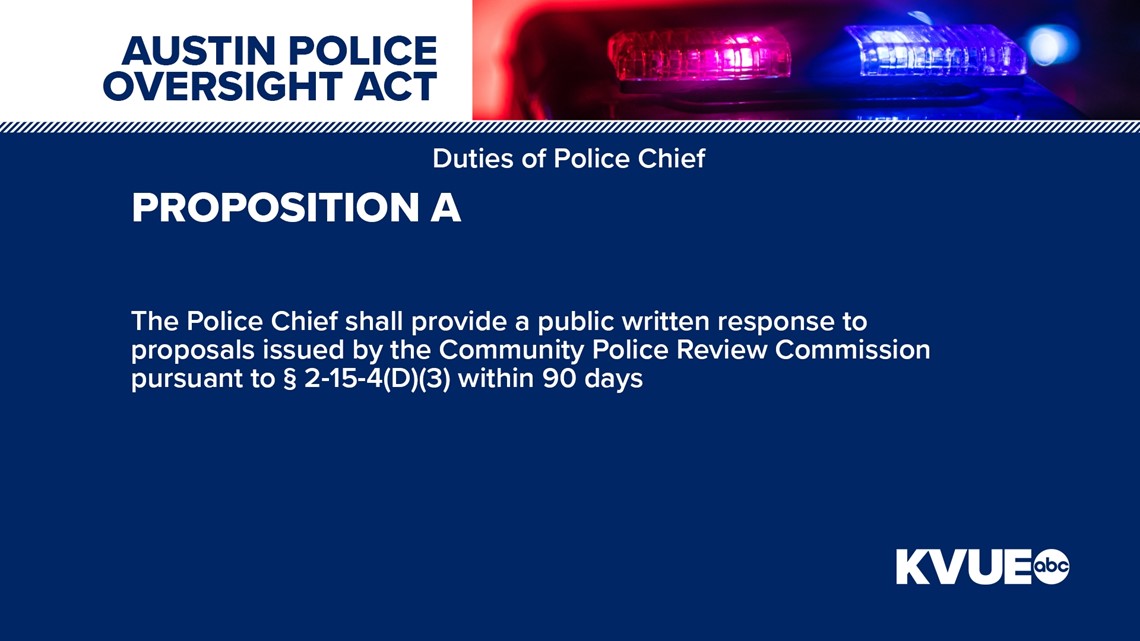
Chapter 2-15-6 Ensuring police transparency
To ensure transparency, Prop A requires a few things Prop B doesn't.
Prop A bans the City from having secret police personnel files related to officer conduct. It also grants the Office of Police Oversight and the Community Police Review Commission "unfettered access" to all information necessary to do civilian oversight, and specifically states the public can request and get dash cam video.

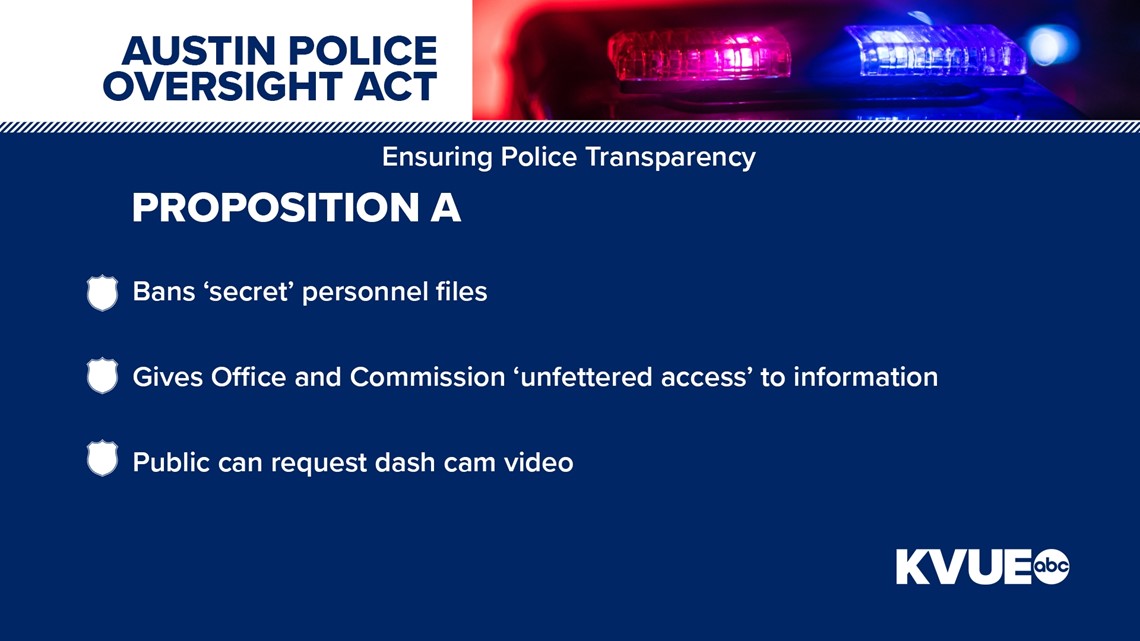
Chapter 2-15-7 Contracts/agreements
Prop A also bans the council from approving police contracts or agreements that allow officers to file grievances about the ordinance.

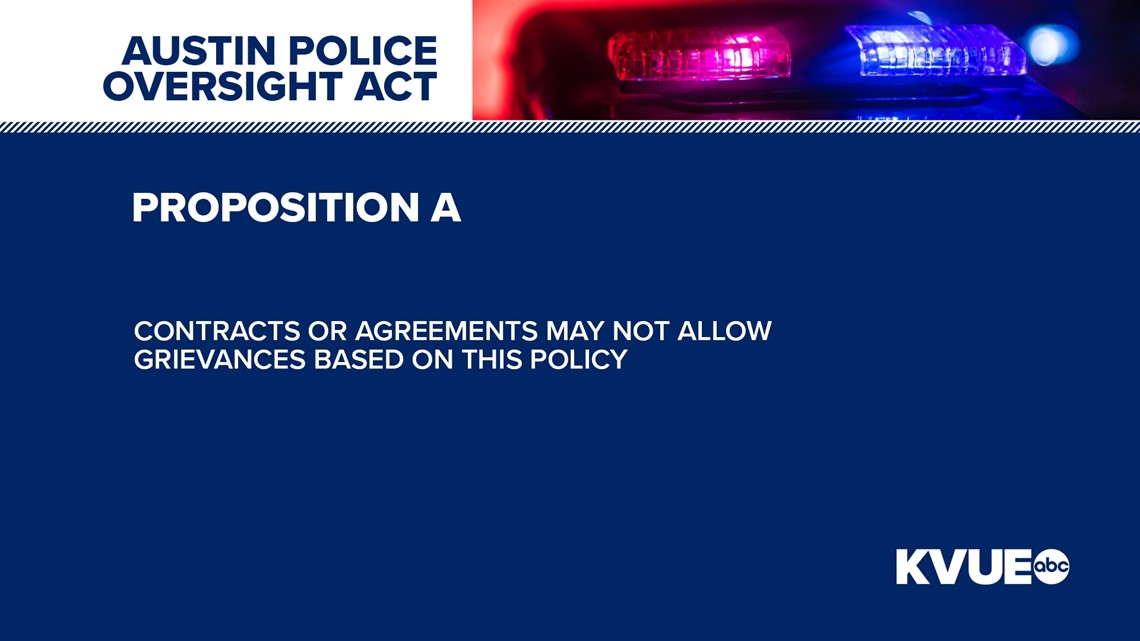
Other agreements
Both props would require any police contracts approved by the council be consistent with the provisions laid out in the ordinances – the props just word this part differently.
Prop A puts a ban on approving contracts that don't follow the provision of the ordinance while Prop B requires all contracts comply with the provisions in the ordinance.

